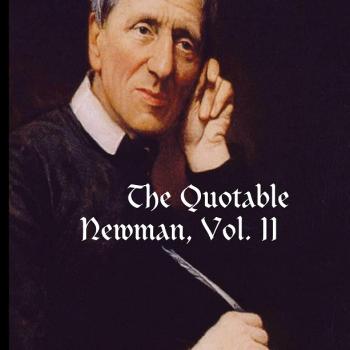Whenever issues of faith and beliefs arise, questions of doubt can be right behind them. We long for objective certainty, and we wonder how possible such certainty is when we speak about our knowledge of God. How much are our beliefs merely subjective expressions or experiences? Can we be certain that there is a reality behind them?
This yearning for objective truth is important and natural. Without it, we wouldn’t be able to operate in this world of overwhelming experiences. Moment by moment, we are bombarded with information through what we see and hear and think and experience. Our ordinary thinking processes and reason give order to what the 19th-century philosopher William James called the “great blooming, buzzing confusion” of sense perception. Objective knowledge and scientific certainty are tools we use -- we must use -- to deal with that blooming and buzzing.
We reach for objective certainty in many areas of our lives, but living as we do in a scientifically defined age, our natural tendency is to use reason and its tools, like mathematics, for every area. But it’s important to understand the limits of science and objectivity. They work as instruments of certainty only when our experiences fall within the parameters of reason as our minds order them.
But sometimes our experiences precede language and reasoning abilities; sometimes our experiences are, we might say, deeper than intellect.
Such experiences are not unusual. Some word or emotion or wave of understanding takes us suddenly by surprise and, though we have had a real experience, we don’t have concepts that apply to it, at least not immediately. We might stand before a mountain vista in awe and realize that there is more in what we are experiencing than we can conceptualize. We might turn the corner in a museum and be overcome by a painting we’ve never seen before. We might fall in love and discover things in ourselves that we’d not known of as well as depths in another person that we have not seen before. What are such experiences? Can we really measure them in such a way that we can understand where they come from, what they reveal, and how we are thus changed?
William James described this experience-before-thought as a “buzzing confusion,” but I think he was wrong about that. If it’s only confusion before our minds organize it, then the order becomes what’s really important. But the order only gives handles on what is most foundational: the experience. Analyzing and explaining my wonder before a glorious sunrise is interesting, but hardly substitutes for the deeper reality of that wonder. Reason may tell me that the rush of perceptions that I experience in surprise, awe, and love is confusion, but the truth is that the experiences are simply overflowing my ability to order them. Nothing more. Still, James’ point is a good one: there is a world of experience prior to the mental, verbal, or systematic representations by which we measure objective truth; we can order that world, but the reality is always more than the concepts by which we arrange it.
Measurements of objectivity apply to experiences that fall within the parameters of our concepts, and since this deeper level of experience precedes such measurements, they are inappropriate categories. The terms “certain” and “uncertain” do not apply. When we try to squeeze these deeper experiences into these categories, we’re only really measuring the concepts by which we order them.
Experiences of faith are of that sort. Since they overflow the concepts that we could apply to them, they require something other than objectivity and its certainty. They require trust and hope.
I say various things to describe my faith: “I believe that Jesus was the Messiah, the Son of God,” “I believe that Joseph Smith was called by God to restore the fullness of the gospel,” “I believe that the Book of Mormon is the word of God.” When I say such things it sounds as if I am giving a list of propositions to which I assent. It sounds like I am using the language of concepts and objectivity, as if perhaps I could say, “I am as certain that Jesus was the Son of God as I am that the earth orbits the sun.” But that is misleading.
It would be a mistake to think that what I call certainty when I bear religious testimony is the same thing I call certainty in geometric proofs or scientific demonstrations. I can say “I am certain that Jesus is the Christ,” or I can say “I believe that Jesus is the Christ.” But when I use “certain,” it is a certainty of assurance rather than the certainty of mathematics. And when I use “believe,” it is the belief I have when I tell my grandson that I believe in him rather than the kind of believing I bring to a statement like “I believe that Boise is the capital of Idaho.”





